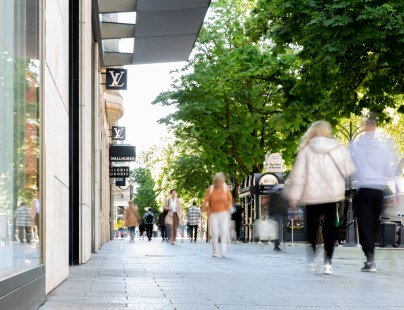
Here, modern life meets stone age culture: The art and fashion metropolis of Düsseldorf is not far from the Neandertal valley, where the museums tell its history. In the cosmopolitan metropolis, art, fashion and lifestyle meld with Rhineland zest for life to create an exciting mix. The cultural diversity of the Rhine metropolis is also shown in its exhibitions: from the carnival, steeped in tradition, with carnival speeches and Funkenmariechen dancers, to Japan Day, a wide range of diverse cultural highlights take place in Düsseldorf.

Trendy city district and renowned museums
An authentic experience of Düsseldorf can be had on a tour of the old town, where an Altbier (German dark beer) in one of the rustic pubs at the "longest bar in the world" is a must. A shopping trip to the famous Königsallee or a walk along the Rhine promenade are all part of a visit to the state capital. The city shows its young, creative side in the trendy Flingern district, where many small fashion boutiques, cafés and galleries have made their home.
In addition to more than a hundred small and large galleries, Düsseldorf also offers visitors an array of art that is unparalleled throughout NRW with its large museums: With Kunstsammlung NRW and Museum Kunstpalast, two internationally renowned museums have found their home in Düsseldorf.

Stone Age Art in the Neandertal
Visitors to the region around Düsseldorf can discover art and crafts from much earlier times: The Mettmann district, which borders Düsseldorf to the east, is also known as Neanderland. in the mid-19th century, the 42,000 year old skeleton of a prehistoric man was discovered in Neandertal - the Neanderthal man. The Neanderthal Museum in Mettmann is dedicated to this special ancestor to humans and explains everything worth knowing about the Neanderthal man and the evolution of modern humans. The most famous hiking trail in the region also runs right past Neandertal: The Neanderland Steig.
More Information
Discover it now!
Contact
Düsseldorf Tourismus GmbH
Postfach 10 21 63
40012 Düsseldorf
Telephone: +49 211 17202-854
Fax: +49 211 17202-1320
E-mail:
ti-altstadt@visitduesseldorf.de
Website:
https://www.duesseldorf-tourismus.de/en












